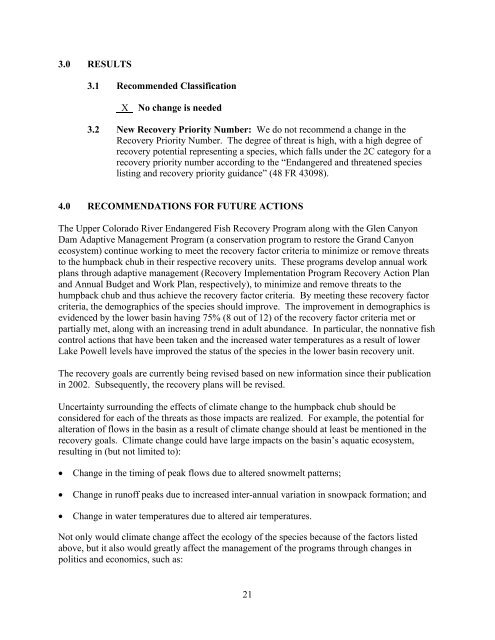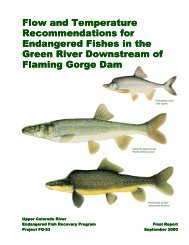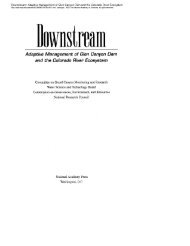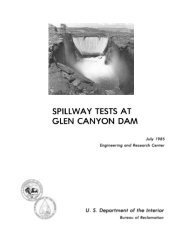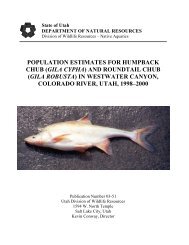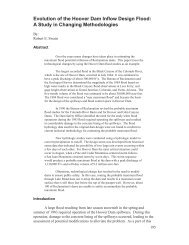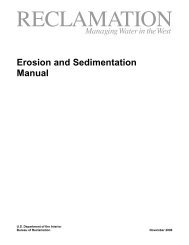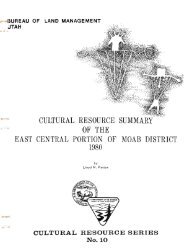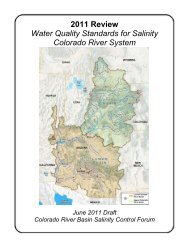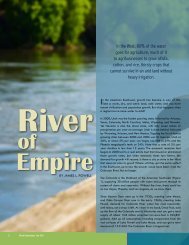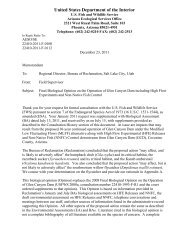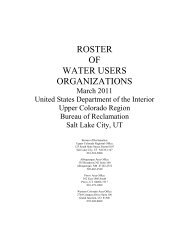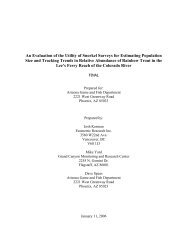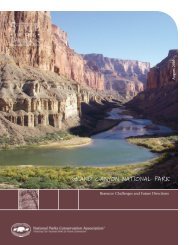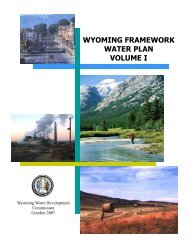Humpback chub (Gila cypha) - Upper Colorado River Endangered ...
Humpback chub (Gila cypha) - Upper Colorado River Endangered ...
Humpback chub (Gila cypha) - Upper Colorado River Endangered ...
Create successful ePaper yourself
Turn your PDF publications into a flip-book with our unique Google optimized e-Paper software.
3.0 RESULTS<br />
3.1 Recommended Classification<br />
X No change is needed<br />
3.2 New Recovery Priority Number: We do not recommend a change in the<br />
Recovery Priority Number. The degree of threat is high, with a high degree of<br />
recovery potential representing a species, which falls under the 2C category for a<br />
recovery priority number according to the “<strong>Endangered</strong> and threatened species<br />
listing and recovery priority guidance” (48 FR 43098).<br />
4.0 RECOMMENDATIONS FOR FUTURE ACTIONS<br />
The <strong>Upper</strong> <strong>Colorado</strong> <strong>River</strong> <strong>Endangered</strong> Fish Recovery Program along with the Glen Canyon<br />
Dam Adaptive Management Program (a conservation program to restore the Grand Canyon<br />
ecosystem) continue working to meet the recovery factor criteria to minimize or remove threats<br />
to the humpback <strong>chub</strong> in their respective recovery units. These programs develop annual work<br />
plans through adaptive management (Recovery Implementation Program Recovery Action Plan<br />
and Annual Budget and Work Plan, respectively), to minimize and remove threats to the<br />
humpback <strong>chub</strong> and thus achieve the recovery factor criteria. By meeting these recovery factor<br />
criteria, the demographics of the species should improve. The improvement in demographics is<br />
evidenced by the lower basin having 75% (8 out of 12) of the recovery factor criteria met or<br />
partially met, along with an increasing trend in adult abundance. In particular, the nonnative fish<br />
control actions that have been taken and the increased water temperatures as a result of lower<br />
Lake Powell levels have improved the status of the species in the lower basin recovery unit.<br />
The recovery goals are currently being revised based on new information since their publication<br />
in 2002. Subsequently, the recovery plans will be revised.<br />
Uncertainty surrounding the effects of climate change to the humpback <strong>chub</strong> should be<br />
considered for each of the threats as those impacts are realized. For example, the potential for<br />
alteration of flows in the basin as a result of climate change should at least be mentioned in the<br />
recovery goals. Climate change could have large impacts on the basin’s aquatic ecosystem,<br />
resulting in (but not limited to):<br />
<br />
<br />
<br />
Change in the timing of peak flows due to altered snowmelt patterns;<br />
Change in runoff peaks due to increased inter-annual variation in snowpack formation; and<br />
Change in water temperatures due to altered air temperatures.<br />
Not only would climate change affect the ecology of the species because of the factors listed<br />
above, but it also would greatly affect the management of the programs through changes in<br />
politics and economics, such as:<br />
21


